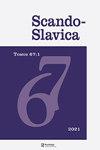Spaces of Collective Memory in Contemporary Russian Women’s Historical Fiction
IF 0.2
0 HUMANITIES, MULTIDISCIPLINARY
引用次数: 0
Abstract
ABSTRACT This article focuses on the connection between collective memory and fictional spatiality in three novels by contemporary Russian female authors: Ljudmila Ulickaja’s Zelënyj šatër, Elena Čižova’s Vremja ženščin, and Guzel′ Jachina’s Zulejcha otkryvaet glaza. These fictionalized versions of the Soviet past aim at overturning the idea of a unitary historical narrative, instead offering multiple ways of looking at the past, often from a female perspective that highlights the role of women in taking on responsibility for the maintaining of history and culture. Moreover, the novels represent an alternative cultural consciousness as a microhistorical fictional space, loaded with cultural and literary-historical meanings. Zelënyj šatër focuses on the literary geography of Moscow as an alternative to the everyday Brežnev-era reality; the alternative city is the locus for the transmission of an earlier cultural heritage in Moscow dissident communities. Vremja ženščin represents the transmission of an Orthodox worldview in post-war Leningrad in a female community and reflects on the cultural mythology associated with St. Petersburg/Leningrad. Zulejcha otkryvaet glaza focuses on a multicultural Soviet labor settlement in the Siberian forest, which echoes both old Tatar myths and the Central-European cultural heritage of the White Leningrad intelligentsia. In exploring alternative ways of looking at historical narratives and constructing possible fictional spaces, these novels aim at making sense of recent history from the perspective of the twenty-first century.当代俄罗斯女性历史小说中的集体记忆空间
摘要:本文主要探讨当代俄罗斯女作家柳德米拉·乌利卡娅的《Zelënyj šatër》、埃琳娜·Čižova的《Vremja ženščin》和古泽尔·贾奇娜的《祖莱伊查·奥克里瓦耶·格拉扎》这三部小说中集体记忆与虚构空间性的关系。这些对苏联历史的虚构版本旨在推翻单一历史叙事的观念,取而代之的是提供多种看待过去的方式,通常是从女性的角度出发,强调女性在维护历史和文化的责任中所扮演的角色。此外,小说作为一个微观历史的虚构空间,承载着文化和文学历史的意义,代表着一种另类的文化意识。Zelënyj šatër专注于莫斯科的文学地理,作为对日常Brežnev-era现实的替代;另类城市是莫斯科持不同政见者社区早期文化遗产传播的场所。Vremja ženščin代表了战后列宁格勒东正教世界观在女性群体中的传播,反映了与圣彼得堡/列宁格勒相关的文化神话。《Zulejcha otkryvaet glaza》关注的是西伯利亚森林中一个多文化的苏联劳工定居点,它既呼应了古老的鞑靼神话,也呼应了白色列宁格勒知识分子的中欧文化遗产。在探索历史叙事的不同方式和构建可能的虚构空间的过程中,这些小说旨在从二十一世纪的角度理解近代历史。
本文章由计算机程序翻译,如有差异,请以英文原文为准。
求助全文
约1分钟内获得全文
求助全文

 求助内容:
求助内容: 应助结果提醒方式:
应助结果提醒方式:


